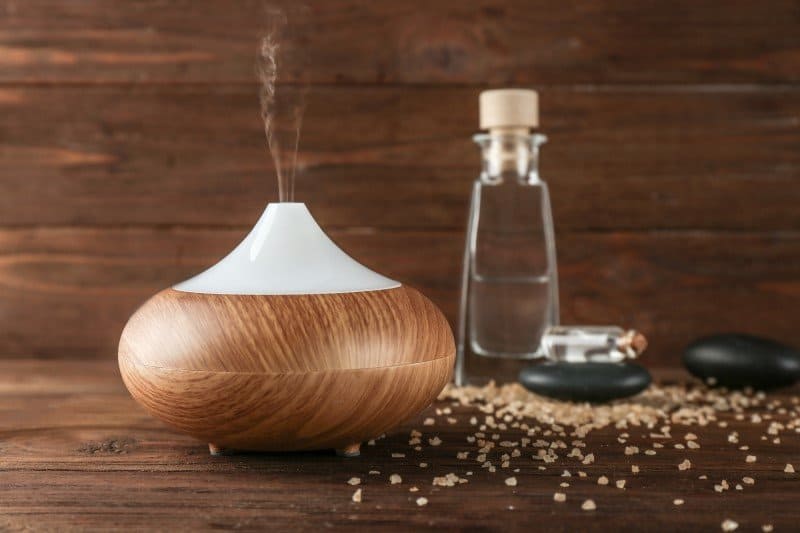I have been looking for diffusers because I’ve recently bought some bottles of essential oils. To be honest, there are a lot of options out there, due to the growing popularity of essential oils. But I’ve researched all the different types and thought about sharing with you the difference between two of the most popular types of diffusers.
What is the difference between a nebulizer diffuser and an ultrasonic diffuser? A nebulizer diffuser uses undiluted essential oils while an ultrasonic diffuser needs water. Moreover, a nebulizer diffuser uses pressurized air to release essential oil molecules into the air, whereas an ultrasonic diffuser uses electronic vibrations.
However, beyond the differences in how they work and how they disperse essential oils into the air, these diffusers also have their own benefits. Each one has its own set of disadvantages, as well. Let’s explore what those are.
The Differences Between Nebulizer Diffuser and Ultrasonic Diffuser
Essential oils are all the rage these days, and diffusers have become a staple in a growing number of households. You can get a diffuser to use essential oils aromatically and to take advantage of their benefits by inhaling their vapors. However, there are different types of diffusers and it helps to know which one to get for your home.
A diffuser is a device that breaks an essential oil into tiny particles and disperses them into the air. In other words, it is the diffuser’s job to evenly release the particles of essential oils at a concentration that doesn’t overpower everything else.
These little molecules give the room a pleasant-smelling ambiance. It can also have a calming, invigorating, or whatever effect the oils promise to deliver.

What is a Nebulizer Diffuser?
A nebulizer diffuser, which is also called a nebulizing diffuser, uses pressurized air in dispersing a mist of essential oil. It works the same way a perfume atomizer does, where a small air pump blows air across a small tube and creates a powerful vacuum. This vacuum pulls the essential oil from the bottom of a distribution tube towards the surface, resulting in a burst of scent or aroma into the air.
With a nebulizer diffuser, you wouldn’t need water or heat anymore. This means that the mist is entirely from the essential oil. And because of this, it is considered a low-maintenance type of diffuser. Moreover, a nebulizer diffuser has airflow controls that will allow you to determine the amount of oil being released into the air.
What is an Ultrasonic Diffuser?
An ultrasonic diffuser uses high-frequency sound waves or electronic vibrations to break down essential oil particles into their base molecules. It uses water to create a fine mist, and then disperses these molecules into the air you breathe so you could take in their benefits.
More specifically, this mechanism involves the oils sitting on top of the water and ultrasonic vibrations agitating it. This action would then cause the oil molecules to separate. These essential oil molecules are negatively charged, so they spread through the air by attaching to the positively charged molecules that are already present in the room.
This type of diffuser is also called humidifying diffuser.
Other Types of Diffusers
Nebulizing diffusers and ultrasonic diffusers are not the only types of diffusers available, though. There are heat or electric diffusers as well as evaporative diffusers.
Heat or Electric Diffuser
A heat or electric diffuser, as its name implies, uses heat or electricity instead of using a fan to turn oil to gas. Candle diffusers and lamp ring diffusers are examples of heat diffusers.
However, this diffuser may not be as effective as you’d hope because heating essential oils changes their chemical properties. This could make them less or more intense depending on their components.
This diffuser does not have a fan, so it is completely quiet.
Evaporative Diffusers
This type of diffuser makes use of a small fan to help turn oil to gas. With this, the essential oils evaporate into the air. As they evaporate, though, the essential oils lose some of their potency.
An evaporative diffuser is an excellent choice for those who want a quick aromatic sensation.
Using an Essential Oil Diffuser
Essential oils can be used either topically or aromatically. Some oils can also be ingested, although many experts advise against this. Applying oils on the skin should also be done with caution as it can cause burns. Follow suggested dilution rates if you choose to do either of these.
So, in effect, the aromatic use of essential oils is the safest method. And using essential oils aromatically with the help of a diffuser in the room has positive results for the people there. You get to take in the healing and supportive properties of the essential oils you are using by merely breathing.
Benefits of Using an Essential Oil Diffuser
There are many benefits to diffusing essential oils, depending on which oils you are using. These benefits include:
- purifying the air
- boosting your mood and energy
- reducing allergens and dust
- relieving stress
- soothing away pain
- promoting restful sleep
- helping balance hormones
- creating a relaxing and therapeutic environment
- mitigating negative emotions
These benefits can support our health and contribute to our physical, emotional, or mental well-being.
And while diffusers do function like some of the air fresheners sold in the market, they do so without the synthetic ingredients and possibly harmful chemicals. Instead, you use pure, natural, organic, and therapeutic-grade essential oils to do the job.
Nebulizer Diffuser vs. Ultrasonic Diffuser: A Closer Look into the Pros and Cons
A nebulizer diffuser and an ultrasonic diffuser each have their own benefits and shortcomings.
| Ultrasonic Diffuser | Benefits:
Disadvantages:
|
| Nebulizer Diffuser
|
Benefits:
Disadvantages:
|
Nebulizer Diffuser vs. Ultrasonic Diffuser: Which One is For You?
A nebulizer diffuser and ultrasonic diffuser are both excellent options and will both deliver the therapeutic benefits you need. But when should you choose one over the other?
Why Get a Nebulizer Diffuser?
However, if you want something that outputs the purest aroma of the essential oils and their maximum benefits, go for the nebulizer diffuser. Getting a nebulizing diffuser is also a great choice if you’re using inhalation aromatherapy for your health and wellness.
It is also the perfect option for you if you don’t mind buying essential oils more frequently, as they will run out fast.
My review: Best Nebulizer Essential Oil Diffusers
Why Get an Ultrasonic Diffuser?
An ultrasonic diffuser is a more practical option. It gives you the benefits without having to spend as much on oils. If you’re also more sensitive to scents and if you prefer them less intense, then this diffuser is perfect.
Moreover, you should go with an ultrasonic diffuser if you want something that humidifies and ionizes the air.
My reviews: Muji Diffuser Review and Rainstone Diffuser Review
Final Thoughts
Choose the one that best fits your needs. Or, buy one of each!
